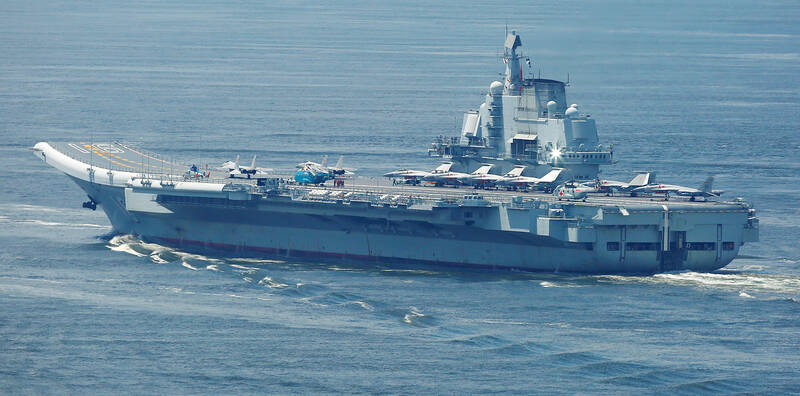Taiwan should develop asymmetric anti-access weapons to counter the burgeoning capabilities of Chinese People’s Liberation Army Navy (PLAN) vessels, the Institute for National Defense and Security Research said in its annual report on China.
The expansion of the PLAN’s capabilities and frequent activities by Chinese warships are part of Beijing’s strategy of exerting control over and isolating the Taiwan Strait, the Taipei-based institute said in the 2022 Report on the Development of the Chinese Communist Party’s Politics and Military, which was published last month.
The PLAN aircraft carrier Liaoning has transitioned from training in China’s near seas to conducting war games in the western Pacific, showing an intent to use the ship in containing US forces based in the region, it said.

Photo: Bobby Yip, Reuters
Meanwhile, other Chinese warships have moved beyond the Bashi Channel and Miyako Strait to the seas between Taiwan and the Japanese island of Yonaguni, it said, adding that the PLAN has transited these waters in nine operations involving 13 ships.
These movements indicate that China is seeking to seize this part of the sea to sever an important line of communication while simultaneously containing Taiwanese and Japanese warships there, the institute said.
Taiwan will have to develop a strategy of multi-layered denial to prevail in a David versus Goliath conflict against superior Chinese forces, it said.
Sea denial requires the use of submarines, land-based and ship-based anti-ship missiles, missile boats and underwater suicide drones, it said.
Submarines — the best naval asymmetric weapons system — should mainly be deployed to the north and south of Taiwan proper to prevent penetration by the PLAN of the Bashi Channel and Miyako Strait and supplement the resiliency of the nation’s air and land denial capabilities, it said.
The military is to receive a prototype of the indigenous submarine before 2025, batches of Hsiung Feng III/IIIE and Harpoon missiles this year through 2030 and 10 Tuo Chiang-class corvettes before 2026, while negotiations to procure US-made underwater suicide drones are ongoing, it said.
PLAN ships conducted 661 movements in the seas surrounding Taiwan from August to December last year, the report said.
Separately, the Ministry of National Defense yesterday said it detected three Chinese military vessels and 16 military aircraft in the seas and airspace surrounding Taiwan.
These include a Xian JH-7 fighter-bomber that crossed over the median line of the Taiwan Strait, and one BZK-007 drone and two J-16 jets that entered the southwestern air defense identification zone, it said.
Taiwan’s armed forces monitored the situation and tasked combat air patrol aircraft, navy vessels and land-based missile systems to respond to China’s actions, it added.
Additional reporting by CNA

The first global hotel Keys Selection by the Michelin Guide includes four hotels in Taiwan, Michelin announced yesterday. All four received the “Michelin One Key,” indicating guests are to experience a “very special stay” at any of the locations as the establishments are “a true gem with personality. Service always goes the extra mile, and the hotel provides much more than others in its price range.” Of the four hotels, three are located in Taipei and one in Taichung. In Taipei, the One Key accolades were awarded to the Capella Taipei, Kimpton Da An Taipei and Mandarin Oriental Taipei. Capella Taipei was described by

EVA Airways today confirmed the death of a flight attendant on Saturday upon their return to Taiwan and said an internal investigation has been launched, as criticism mounted over a social media post accusing the airline of failing to offer sufficient employee protections. According to the post, the flight attendant complained of feeling sick on board a flight, but was unable to take sick leave or access medical care. The crew member allegedly did not receive assistance from the chief purser, who failed to heed their requests for medical attention or call an ambulance once the flight landed, the post said. As sick

Minister of Economic Affairs Kung Ming-hsin (龔明鑫) yesterday said that private-sector refiners are willing to stop buying Russian naphtha should the EU ask them to, after a group of non-governmental organizations, including the Centre for Research on Energy and Clean Air (CREA), criticized the nation’s continued business with the country. While Taiwan joined the US and its Western allies in putting broad sanctions on Russia after it invaded Ukraine in 2022, it did not explicitly ban imports of naphtha, a major hard-currency earner for Russia. While state-owned firms stopped importing Russian oil in 2023, there is no restriction on private companies to

INDUSTRY: Beijing’s latest export measures go beyond targeting the US and would likely affect any country that uses Chinese rare earths or related tech, an academic said Taiwanese industries could face significant disruption from China’s newly tightened export controls on rare earth elements, as much of Taiwan’s supply indirectly depends on Chinese materials processed in Japan, a local expert said yesterday. Kristy Hsu (徐遵慈), director of the Taiwan ASEAN Studies Center at the Chung-Hua Institution for Economic Research, said that China’s latest export measures go far beyond targeting the US and would likely affect any country that uses Chinese rare earths or related technologies. With Japan and Southeast Asian countries among those expected to be hit, Taiwan could feel the impact through its reliance on Japanese-made semi-finished products and